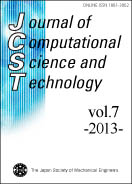Current issue
Displaying 1-6 of 6 articles from this issue
- |<
- <
- 1
- >
- >|
Papers
-
2013 Volume 7 Issue 3 Pages 354-362
Published: 2013
Released on J-STAGE: July 26, 2013
Download PDF (450K) -
2013 Volume 7 Issue 3 Pages 363-378
Published: 2013
Released on J-STAGE: August 27, 2013
Download PDF (1355K) -
2013 Volume 7 Issue 3 Pages 379-394
Published: 2013
Released on J-STAGE: August 27, 2013
Download PDF (1187K) -
2013 Volume 7 Issue 3 Pages 395-409
Published: 2013
Released on J-STAGE: September 03, 2013
Download PDF (2157K) -
2013 Volume 7 Issue 3 Pages 410-425
Published: 2013
Released on J-STAGE: September 27, 2013
Download PDF (13260K) -
2013 Volume 7 Issue 3 Pages 426-436
Published: 2013
Released on J-STAGE: December 10, 2013
Download PDF (439K)
- |<
- <
- 1
- >
- >|
